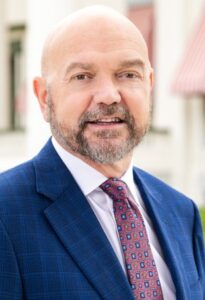With more states adding or considering restrictions on third-party funding of lawsuits, one of the largest litigation finance firms is now planning to invest directly in some law firms.
“We are pursuing strategic minority investments in firms where we can support their growth and expansion plans, as a passive investor,” Travis Lenkner, chief development officer for Burford Capital, said in a statement this week.
The company would not say which law firms it may be considering for investment, but it is in talks with several firms, according to news reports.
The idea is “very troubling,” and raises ethical concerns about where a lawyer’s loyalty would lie – with the client or with the outside stakeholders of the firm focused on profits and big verdicts, said William Large, president of the Florida Justice Reform Institute, an organization that has advocated for tort reform and prohibitions against ownership of law firms by nonlawyers.

The publicly traded Burford, founded in 2009, has helped finance a number of high-profile lawsuits in recent years, leading property-casualty insurers, business chiefs and some lawmakers around the country to argue that third-party funding leads to unnecessary lawsuits that drive up costs.
5-Year Cost of Litigation Funding to Commercial Insurers Could Top $25B
Funding investors have countered that financing litigation can make it possible for more plaintiffs to afford protracted litigation, which can cost millions of dollars over many years.
At least 16 states in the last five years have approved statutes that require disclosure of litigation-funding parties or licensing of or reporting by the financiers.
In Florida, which has seen a big impact on insurance costs and premiums from extensive claims litigation, a similar bill failed to pass the Legislature last year. It would have required disclosure of funding parties and would have barred financiers from influencing the outcome of cases. Federal legislation in Congress also has gained little traction since it was introduced last year.
And most states’ statutes strictly forbid ownership of law firms by nonlawyers. Only Arizona allows direct nonattorney ownership of law firms, although Utah and Washington, DC, have relaxed some restrictions, Bloomberg reported.
Burford Capital believes it may have found a way around states’ prohibitions – through the use of a bifurcated arrangement involving managed service organizations, or MSOs: The lawyers in a law firm would handle the legal work through a lawyer-owned entity. The MSO would control the firm’s assets and sell back-office services to the law firm for a fee, according to Bloomberg and the Financial Times news reports.
It’s uncertain if such an arrangement would be considered legal in most states, or if they would be challenged in courts or state legislatures. A ruling early this year by the Texas Bar’s Professional Ethics Committee appeared to give the nod to MSOs for law firms, under certain conditions: Law firms could not split their fees with the managing organization.
“A lawyer may own an equity interest in a company owned in part by nonlawyers so long as the company does not engage in the practice of law,” and ethics rules still apply, the opinion noted.
The ethics committee did not directly address the other side of the coin: When a non-lawyer invests in a law firm. But the opinion has been seen as opening the door for the unusual investment structure, at least in some states.
“While acting only as persuasive authority, Opinion No. 706 confirms that, when structured correctly, law firm MSOs are a viable option for lawyers, investors and service providers,” wrote Trisha Rich, a partner with the Holland & Knight law firm.
Florida’s Bar rules do not appear to directly address MSOs or similar business structures.
“A lawyer shall not form a partnership with a nonlawyer if any of the activities of the partnership consist of the practice of law,” the rule reads. “A lawyer shall not practice with or in the form of a business entity authorized to practice law for a profit if: (1) a nonlawyer owns any interest therein, except that a fiduciary representative of the estate of a lawyer may hold the stock or interest of the lawyer for a reasonable time during administration; or (2) a nonlawyer is a corporate director or officer thereof or occupies the position of similar responsibility in any form of association other than a corporation; or (3) a nonlawyer has the right to direct or control the professional judgment of a lawyer.”
The Florida Bar and the Supreme Court in 2022 also declined to adopt a Bar committee’s recommendation to try a pilot program of nonlawyer ownership and fee splitting with nonlawyers. The court did not address the MSO-type of investment structure.
Whether it’s legal or not, any type of outside ownership arrangement is simply bad policy, Florida’s Large said. He argued that if allowed, it would threaten the bedrock of America’s justice system. Large, a lawyer himself, compared large-scale law firm ownership by investors to the arrangements that led to the U.S. financial crisis of 2008: Lack of ownership and accountability over the millions of subprime mortgages that were bundled and sold off to investors.
Currently, most law firm partners are, in effect, owners of their firm and are held responsible for the firm’s decisions. But if an outside investor becomes the factotum owner, lawyers may eschew responsibility, encouraging a decline in independence and in the quality of legal representation, Large said.
Outside ownership of law firms “will adversely impact the stability of the practice of law in our state and lead to a slippery slope of problematic issues as more and more nonlawyer entities seek to gain some semblance of control over law firms in the state, with their focus on the bottom line of profitability as opposed to the needs of clients,” Large wrote in a 2021 to Bar committee members who were contemplating the nonlawyer ownership pilot program.
Burford, with offices in New York and the UK, has a market capitalization of $3 billion, putting it in the realm of some of the largest private equity firms, the Times and Bloomberg reported. Insurance groups have said that such heavyweight funding would land mostly on the plaintiffs’ side, fueling excessive litigation and large verdicts that would have an impact on loss adjustment expenses.
Burford, calling itself “the gold standard in legal finance,” said it understands the legal and ethical considerations of its plan.
“As the world’s leading legal finance provider, we understand the business of law and the importance of law firm culture and professional independence,” Burford’s Lenkner said in an emailed statement.
Top photo: Adobe Stock (AI-generated)
Update: This article has been corrected to show that Burford market capitalization level.
Topics Lawsuits
Was this article valuable?
Here are more articles you may enjoy.



 Premium Slowdown, Inflation Factors to Lead to Higher P/C Combined Ratio: AM Best
Premium Slowdown, Inflation Factors to Lead to Higher P/C Combined Ratio: AM Best  Florida Appeals Court Pulls the Plug on Physician Dispensing in Workers’ Comp
Florida Appeals Court Pulls the Plug on Physician Dispensing in Workers’ Comp  Kyle Busch and Wife Settle Lawsuit With Pacific Life and Insurance Agent
Kyle Busch and Wife Settle Lawsuit With Pacific Life and Insurance Agent  ‘Meaningful Decline’ in Industry Q1 Underwriting Profit Expected From Winter Storms
‘Meaningful Decline’ in Industry Q1 Underwriting Profit Expected From Winter Storms 


